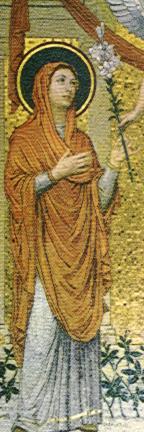HARMONY
From harmony, from heavenly harmony,
This universal frame began:
When nature underneath a heap
Of jarring atoms lay,
And could not heave her head,
The tuneful voice was heard from high
`Arise, ye more than dead.'
Then cold, and hot, and moist, and dry
In order to their stations leap,
And Music's power obey.
From harmony, from heavenly harmony
Thus universal frame began;
From harmony to harmony
Through all the compass of the notes it ran,
The diapason closing full in man.
JOHN DYRDEN 'S Song for St. Cecilia's Day.
.
Cecilia's day is very special for all those who not only love music, but also use it as an instrument to glorify and praise God, the author all harmony. For to-day we honour and give thanks to the life and martyrdom of St. Cecilia, the patron of musicians. I know it has always been a favourite of mine, and a good reason for listening to some of my very favourite pieces of music such as Gounod's Mass for St. Cecilia's day.
Music gives great delight to many, but for the Christian it has always had a special place in worship. The Liturgy is supposed to be sung, so are the various Litanies for different occasions as well as the Daily Offices. Such chanting has a "pleasing effects ... which delight all ages" and is "as seasonable in grief as in joy." It is also "a help to our own devotion" as it stirs up "that very part of man which is most divine." Moreover "in harmony the very image and character even of virtue and vice is perceived [and] the mind delighted with their resemblances," which in turn often leads to "a love of the things themselves." Quoting from St. Basil, Richard Hooker added that music in worship strengthens "the meditation of those holy words" and raises "up the hearts of men". No wonder so many musicians have devoted their lives to writings various settings of the Mass, Psalms and the Canticles.
Accordingly it is one of the few saints' days which is usually marked with various special concerts throughout the country. I often ask myself on this day, I wonder if the musicians who are making all this wonderful music know anything about the saint whom they are honouring. Even the Church is not sure exactly when she lived, but most probably sometime in the second or third century in Rome. Her patrician parents had Cecilia baptised and so she was brought up as a Christian.
Although she had no wish to marry, she was forced into a marriage with Valerius who was a pagan. Somehow she was able to convince him to respect her virginity, and eventually persuaded him to become a Christian. She also convinced his brother, Tiburtius, the joys of the Christian life. The two brothers devoted their lives to acts of love, but when they were caught burying the bodies of martyred Christians, they were brought before the Roman authorities. Refusing to sacrifice before the gods, they were beheaded at Pagus Triopius, near Rome. Cecilia had no hesitation in giving her brothers a proper burial, but this act of defiance led to her own arrest, and subsequently the death penalty. Her death was more horrible than the brothers, as the executioner bungled his job of beheading, and she lingered for three days before finally departing this earthly life. We have to remember that much of this is based on legend; but there is some substantial evidence of a Roman matron, Cecilia who founded a church in the Trastevere, Rome.
She has only been patron of music since the sixteenth century, when with the foundation of the Academy of Music in Rome in 1584, she was chosen as its patroness, based on the evidence of her antiphon taken from her Acts:
as the organs (at her wedding feast) were playing, Cecilia sung (in her heart) to the Lord, saying: may my heart remain unsullied, so that I be not confounded.
Being the patron saint of music, this day enables us to meditate upon the whole sense of harmony, intricacies, weavings and sheer loveliness which make a whole work. Thus music is an ikon for the Trinitarian God where the Three persons of the Godhead are One. Each has given to the creation of this cosmos that has an order and harmony by the very laws of nature. Hooker expressed this harmony existing within the universe in the following way:
Of Law there can be no less acknowledged, than that her seat is the bosom of God, her voice the harmony of the world: all things in heaven and earth do her homage the very least as feeling her care, and the greatest as not exempted from her power, both angels and men and creatures of what condition soever, though each in different sort and manner, yet all with uniform consent, admiring her as the Mother of their peace.
On this day as we honour St. Cecilia, dear Lord give us her courage to be faithful to You through all things, and let our songs be always of praise and thanks to You as an act of our faithfulness. Amen.

